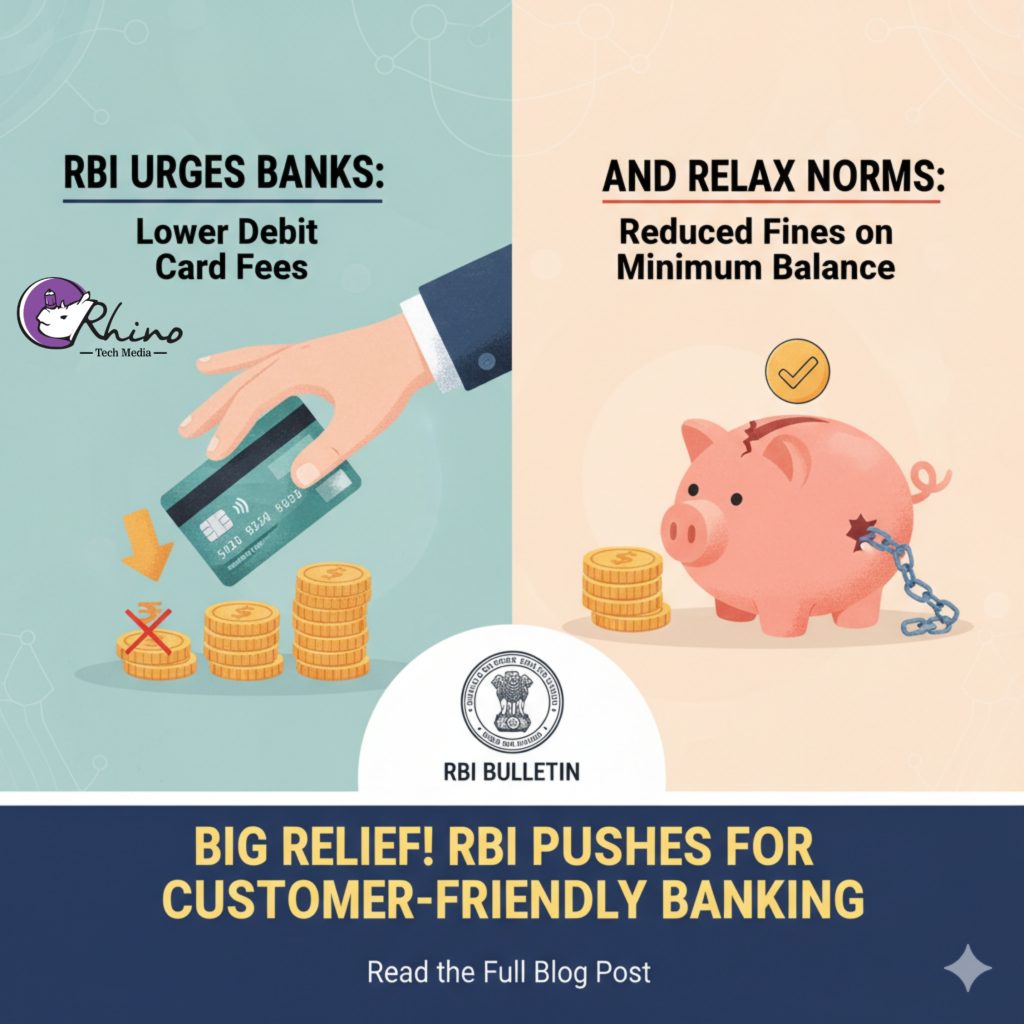RBI Pushes Banks to Cut Debit Card Fees and Lower Minimum Balance Fines: A Report
In recent weeks, the Reserve Bank of India (RBI) has taken a firmer stance on service charges which many banks levy, particularly those that disproportionately affect low‐income customers. Among the charges under scrutiny are fees for debit cards, penalties for failing to maintain minimum average balance (MAB) requirements in savings accounts, and late payment or default fees. This move marks a shift in regulatory philosophy toward greater fairness in the retail banking sector.
What Has the RBI Asked
- RBI officials have asked banks to reduce service charges, including:
- Debit card fees — charges that may be levied for issuing, renewing, or using debit cards.
- Minimum balance violation penalties — fines charged when a customer’s average monthly balance falls below the bank’s prescribed threshold.
- Late payment/other similar retail fees — for example, late payment charges or fees tied to delayed loan repayment.
- Importantly, no specific caps or explicit regulatory limits have been prescribed so far by RBI. The regulator has requested banks to voluntarily reduce fees, leaving the quantum of reduction to bank discretion.
- RBI is especially concerned about the impact on low‐income customers, who often bear the brunt of such fees. The push is seen as part of promoting greater financial inclusion and fairness.
Context & Background
To understand why RBI is pushing this, it’s useful to look at:
- Retail banking growth: Banks in India have been expanding in the retail segment (personal loans, small business loans, etc.), after suffering losses in corporate loan portfolios. This has increased focus on consumer banking settings.
- Fee income revival: After a period of slower growth, banking fee income has started to rebound. For example, in the quarter ending June, bank fee income rose ~12% year‐on‐year to about ₹51,060 crore.
- Variations in charges across banks & products: There is a wide disparity in what different banks charge for similar services, and in how strictly minimum balance rules are enforced. This variation is drawing RBI’s attention.
- Minimum balance policies already evolving: Several public sector banks have already begun waiving penalties for non‐maintenance of minimum balances. SBI eliminated minimum balance requirements some years back; others like Canara Bank, Punjab National Bank, Indian Bank have followed suit or are considering doing so.
Implications & Possible Effects
- For customers (especially low‐income): If implemented reasonably, reduced fees will ease the burden on those who occasionally fall short of minimum balances or whose debit card usage or renewal imposes fees. This could promote bank account usage, help reduce “banking fatigue,” and improve satisfaction.
- For banks’ revenues: These fees currently constitute a non‐trivial stream of income. Reductions or waivers may cut into fee income significantly, particularly for banks that rely more on penalty and service charges. The shift may force banks to adjust their business models, cost structures, or other income sources.
- Operational changes: To maintain profitability while reducing fees, banks may increase efficiencies, shift more customers to digital channels (which are cheaper), revise cost structures, or increase charges elsewhere (though such balancing acts can be risky).
- Regulatory risk & reputational risk: Banks failing to adjust in line with RBI expectations may face criticism, regulatory scrutiny, or consumer backlash. Being seen as exploitative of vulnerable customers can damage credibility.
- Financial inclusion & fairness: Lowering fees aligns with broader policy goals of financial inclusion — making banking accessible and affordable. It may also help reduce dormant accounts, attract more people into the banking system, and ensure that small depositors aren’t unduly penalized.
Challenges & Considerations
- Balancing cost vs affordability: Banks will need to ensure they cover costs of maintaining accounts, cards, etc., especially for less profitable accounts (rural, small depositors). Fee income helps absorb costs; reducing them without offsetting losses could affect service quality.
- Standardisation vs flexibility: Since RBI has not prescribed fixed caps, different banks will respond differently — some may reduce charges substantially, others minimally. This could lead to continued disparity, unless clearer regulatory guidance is given.
- Risk of premium‐charging shifting: Banks may reduce some fees but increase others (for example, higher charges for certain transactions, digital vs physical, cross‐border, etc.). The net burden on customers might shift rather than reduce.
- Transparency issues: For customers to benefit, they must be clearly informed about what charges they incur, what minimum balances are, what penalties, etc. Lack of clarity or opaque policies can still disadvantage consumers.
- Impact on financial performance: Especially for smaller banks, losing fee income could affect profitability, capital metrics, growth plans unless compensated elsewhere.
Conclusion
The RBI’s recent push for banks to cut debit card fees and lower or even remove penalties for minimum balance shortfalls marks a meaningful step toward more equitable banking in India. While the regulator hasn’t imposed strict rules yet, the signal is strong: ensuring that banking services do not become inaccessible due to punitive fees is becoming a priority.
For customers, especially those with modest means, this move has potential to reduce financial stress. For banks, it will require strategic adjustments to balance profitability, cost management, and fair treatment. In the longer term, if this leads to more inclusive banking, stronger customer trust, and more widespread use of banking services, the overall benefits could outweigh the costs.

